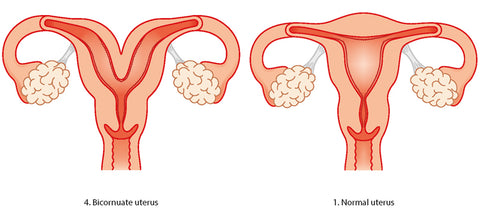
A bicornuate uterus is rare, but most people don’t experience any issues. WUKA experts answer your questions about the condition and how it can affect the menstrual cycle.
What is a bicornuate uterus?
Some women are born with a slightly different uterus to everyone else. Referred to as abnormality of the womb, or congenital uterine abnormality, the condition can be quite common and many don’t actually know they have it until out shows up on an ultrasound, or they experience issues during pregnancy.
According to the NHS, a bicornuate uterus, formed before birth, has a distinct appearance, with a deep indentation at the top which makes it look a little like a love heart. The uterus, usually shaped a bit like a pear, is a hollow cavity that expands during pregnancy in order to house your growing baby. If you have a bicornuate uterus, the top is separated by tissue, which causes it to have two separate- but linked cavities rather than one.
In most cases, women with a bicornuate uterus don’t experience difficulties with conceiving or during early pregnancy, but later on there could be a higher chance of miscarriage or premature birth because of it. In some cases, the shape of the uterus can affect how the baby is positioned during later pregnancy, so usually a c-section is recommended for safe delivery.
How does a bicornuate uterus affect periods?
Around four in every 1000 women have a bicornuate uterus, and most will not be aware, nor will they experience any issues at all. However, for some it can be an issue even before they become pregnant or try to conceive.
According to this research, last updated in 2022, experiencing period problems could be the first indication that a bicornuate uterus may be present. The study found that most people with the condition suffer with heavy and painful periods during adolescence, due to ‘the presence of two uterine cavities’ and goes on to highlight the fact that ‘a significant number of women are diagnosed when they present with obstetric complications.’
Does a bicornuate uterus affect fertility?

According to the same research, women with a bicornuate uterus are more likely to experience issues with becoming pregnant, affecting 1.1% of women who are unable to conceive, 2.1% of women who suffer miscarriage, and 4.7% of women struggling with infertility and recurrent miscarriage. Although the NHS advises that miscarriages are common, recurrent miscarriages ( three or more in a row) only affect one in 100 people in the UK, and there are support services that you can be referred to for help if you need it, such as The Miscarriage Association or Tommy's.
It’s not impossible to get pregnant or to deliver a healthy baby if you have a bicornuate uterus. Premature labour is a big risk, which can be managed by your doctor. Postpartum haemorrhaging can also be an issue, which again can be managed post delivery.
Your doctor will explain all of the potential risks to you and your baby during pregnancy if you have a bicornuate uterus, so that you can spot the signs of premature labour, and so that you can be aware of the potential outcome of your pregnancy. Read more about fertility implications of a bicornuate uterus via the Tommy's website here.
What are the signs of a bicornuate uterus?
In most cases, a bicornuate uterus is only picked up during pregnancy, when an ultra sound scan is performed. Some women will experience symptoms however, including:
- Recurrent miscarriages
- Heavy and painful periods
- Vaginal bleeding
- Pain during sex
- Pelvic pain
We wanted to know more about what it’s like to have a bicornuate uterus, so we put our questions to a very special woman who was diagnosed in her 30s…
How did you come to realise you had this condition?
When my period started aged 12, I always had a ‘break’ of 24-48hrs and then the ‘second half’ of my period would begin. My mum just said it was weird, but as everything else seemed normal it wasn’t something to worry about.
When I reached my early 30s I had a scan for sharp pain on the right hand side, which didn’t show anything bad thankfully- but when I spoke to the technician I mentioned having a break in my periods and her response was: “I can tell you why….”
She showed me the image of my heart-shaped womb on the screen. It was a bit weird! She said basically one half of my period is from one side, and then the other half sheds for part two.
What does it mean for your period?
I get extra period pain when part two starts (but usually not as bad as part one). It’s a bit annoying as I still pretty much have to wear full periodwear because I don’t always know how long it goes on for or when it starts again. It’s regular, so every 27/28 days.
If you're experiencing heavy and painful periods, we recommend our Super Heavy or Heavy flow period pants for peace of mind, gentle support when you need it and 100% leak-proof confidence.

How do you manage your period?
I’ve never known any different, so I guess it’s just a normal period ‘with a break’! I think apart from that it’s fairly normal (besides being very heavy and painful…).
Period pants can be a great option for those with a bicornuate uterus who are suffering with heavy and painful periods. Shop by flow, or by collection to find the right fit for you, so you can eliminate one worry during your cycle.
What symptoms should people look out for?
If you have a short break in your period, for example for a couple of days, but not two periods per month, I think that’s a separate issue. Many people will never know they have it apparently, and will never be bothered by it.
The GP said not to worry about it unless things change (still not really any indicator of what is causing pain on the right hand side…). She also said that it shouldn’t affect pregnancy, but there is a chance if it can and cross that bridge as and when.
What questions do you recommend asking your GP?
It sounds like often people have this, and have no idea- and no issues! If you have anything you’re worried about or have pain, it’s good to ask a GP anyway what may be causing it and what help is available.
If you find you have it, as mentioned it can cause miscarriages and pregnancy problems, so I imagine it’s worth keeping a check on if this is relevant!
If you're concerned about any of of the symptoms you're experiencing during your cycle, please seek advice from your doctor. Tracking your cycle is always a good idea, to help you better understand your body and your cycle; tracking also helps you to answer your doctor's questions so that the best plan of treatment can be recommended for you.
A bicornuate uterus is not common, and in most cases it will not cause an issue- but if you suspect you might have the condition, professional medical advice is always recommended.
Related posts
Understanding Your Menstrual Cycle
How Many Days Between Periods?
Five Self Care Tips to Ease Period Cramps
FAQs
Can you have a baby if you have a bicornuate uterus?
Yes you are still able to have a baby if you have a biconruate uterus, but your doctor will make you aware of the potential outcomes due to the condition. You will be at higher risk of premature labour, and in some cases a caesarean section will need to be performed to safely deliver baby.
Can you go full term with a bicornuate uterus?
In mild cases, a bicornuate uterus will not be an issue throughout the entire pregnancy- so yes, you can go full term, or close to full term.
In some cases, however, premature labour is a potential outcome that your doctor will prepare you for.
What causes a bicornuate uterus?
A bicornuate uterus is formed before birth, due to abnormal development of the mullerian ducts.